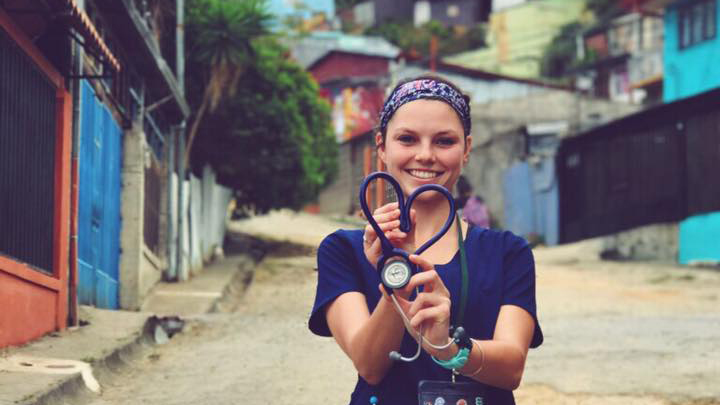
Nursing students lend a healing hand in Costa Rica
In the poverty-stricken outskirts of San Jose, Costa Rica, 15 UMaine Nursing International students dedicated their spring break to applying their education and developing new skills.
There, they met with community leaders and set up a community clinic where they partnered with local doctors to provide acute care to people that would not otherwise have access to health services.
“Students not only learn to complete and help each other with health assessments, they also develop cultural competence, and for many students who have never traveled overseas it’s their first exposure to poverty,” said Nilda Cravens, a School of Nursing lecturer who served as a faculty leader this year.
Cravens, who has experience as a Peace Corp volunteer, feels that her skill with helping underserved communities should be shared, and the connections she is able to make with students compound the rewards of her effort.
“This trip not only helps your nursing skills tremendously, you gain such an awareness of global health and how to work with different cultures,” said Natalie Bolduc, a nursing senior from Dixfield, Maine who currently serves as President of UMaine Nursing International.
“The United States is becoming very diverse and I think it’s important for nurses to become culturally competent and so I think travelling to a different country with a language barrier will, in the long run, help nurses in Maine provide care that meets peoples’ cultural needs.”
The group arrives prepared to donate their expertise, suitcases of medical supplies, and toys and clothing for children donated by other kind-hearted Mainers.
“We feel very strongly that we represent the United States, our university, our state and the nursing profession. People will remember us. They might not remember us in particular but they will remember these people who came from the U.S. who brought help they needed,” Cravens said.
The trip requires months of preparation, students meet weekly in the preceding semester to learn about each other and their destination, and fundraise in their spare time. Students partially finance their experience, and earn no credit for their participation, but something makes them sign up year after year.
“Our guide group, International Service Learning says healing is an international language. Even though I did not speak a lot Spanish, I still spoke enough that I was able to laugh and joke around and make a connection,” said Nyia Chituck, a junior nursing student from Knox, Maine, who participated in the program for the second time this year.
For Bolduc, the smiles she receives are best gifts of all.
“We not only help medically, we help emotionally as well. I think that’s one of the most beautiful things about nursing,” she said.
“These are the moments that show us why nursing is what we want to do with the rest of our lives.”
UMaine Nursing International is a student-led group that has traveled Central America every year since 2012 to provide health care in developing nations. To learn more about the School of Nursing and its programs, visit umaine.edu/nursing.
